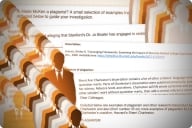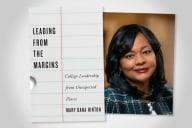You have /5 articles left.
Sign up for a free account or log in.
Amid other woes as their core business shrinks, textbook publishers say they lose tens of millions of dollars a year when students buy pirated versions of their works. Technology and improved distribution have made it easier for counterfeiters to make and sell their alternatives, and while publishers have ramped up their own defensive tactics, the producers of the faked texts are often faceless and nameless.
Some of the other players in the counterfeiting chain -- the producers frequently sell to wholesalers, who sell to distributors, who ultimately sell to consumers -- have names and faces, though, and the publishers have stepped up their efforts to encourage, or force, them to try to combat piracy. In recent months, Cengage and McGraw-Hill said they would institute new measures aimed at identifying pirated materials. And three publishers -- Cengage, McGraw-Hill and Pearson Education -- reached an agreement with the distributors Chegg and Ingram to embrace a set of Anti-Counterfeit Best Practices that will involve significant changes in how the distributors operate.
On Wednesday, though, after what the publishers said were unsuccessful negotiations, they sued another major company in the educational materials space, the bookstore operator Follett, for copyright and trademark violations involving "the distribution of unlawful counterfeit copies of educational textbooks" produced by the three publishers. "Defendants refuse to conduct due diligence on their suppliers and fuel the counterfeit market by relying on the process of buying and inspecting counterfeits instead of not buying them in the first place," the complaint alleges.
"They desire to have the largest possible margin on the books, and to do that, they're buying from the lowest-priced sources," which are illegitimate ones, said Matt Oppenheim, a lawyer representing the publishers.
In a statement, Follett said it takes piracy seriously but that adopting the publishers' preferred approach would "cripple the campus store’s ability to provide lower-cost course material options, leaving students little choice but to buy higher-priced texts from the publishers."
Battle of Behemoths
At a time of great public concern over rising tuition and student debt, there is some irony that both sides in this dispute between major companies cite the greediness of the other. Oppenheim conceded as much in an interview, up to a point. "Yes, all companies are profit minded," he said. "But there's a line you don't cross: doing things that are illegal."
The publishers assert that by selling students books that have been pirated, Follett is clearly violating federal copyright and trademark law, as one can be liable without having any intent or prior knowledge.
The publishing companies said they took a series of steps aimed at working with Follett before filing the lawsuit, including training its employees on avoiding buying pirated books and identifying them once they've been purchased. But ultimately, the parties ended up "at loggerheads," said Oppenheim.
"Defendants have continued their practice unabated, contending that they adequately ferret out many of the counterfeits they receive by inspecting at least some of the books for authenticity upon receipt," the complaint states.
The lawsuit claims that the publishers bought "counterfeit copies of at least 46 textbook titles" from Follett's stores and websites this spring, as well as receiving other pirated books from customers who had bought them from Follett. "But this is a mere snapshot," the complaint states. "The true scope of [Follett's] distribution of counterfeits is likely much greater and not precisely known to defendants, who fear that what they know to date is only the proverbial tip of the iceberg."
Follett took a very different approach than Chegg and Ingram did when the publishers approached those companies in a similar way, Oppenheim said.
Adopting the "best practices" -- which include requiring and revealing much more identifying information about whom they buy books from, and inspecting purchased books much more rigorously for counterfeits -- required Chegg and Ingram to "make changes in way they conducted their business. They squared up, took responsibility and took steps to address" the problem, he said.
Pushback From Follett
In its statement, Follett acknowledged that counterfeiting "hurts everybody in the industry" and said it had worked for decades to combat piracy. But the bookstore provider focused most of its response on explaining why the strategies the publishers are pushing on textbook resellers are self-interested.
"The publisher group had been pressuring Follett and other campus retailers and text distributors to adopt certain 'best practices' created by the publishers that Follett believes would effectively restrict access to low-cost used and rental course materials on campus," the company said. "Follett’s mission is to serve the physical and digital course material needs of its higher education institutional partners and their students through cost-saving options that include used textbooks and Follett’s text rentals that offer an average savings of nearly half the cost of new texts from publishers."
Asked in a follow-up email to respond to the lawsuit's allegations and to detail how it is combating counterfeiting, Follett said that "identifying books as counterfeits is as much art as science," but laid out its process for trying to do so. The company regularly inspects books, with special attention to those believed to be "frequently counterfeited"; quarantines "all similar textbooks" from any shipment found to contain a faked book; and either destroys or sends back to the publisher all such textbooks.
The company did not respond to any of the specific allegations made by the publishers, who are seeking monetary damages as well as an injunction to force Follett to stop buying counterfeited textbooks.









